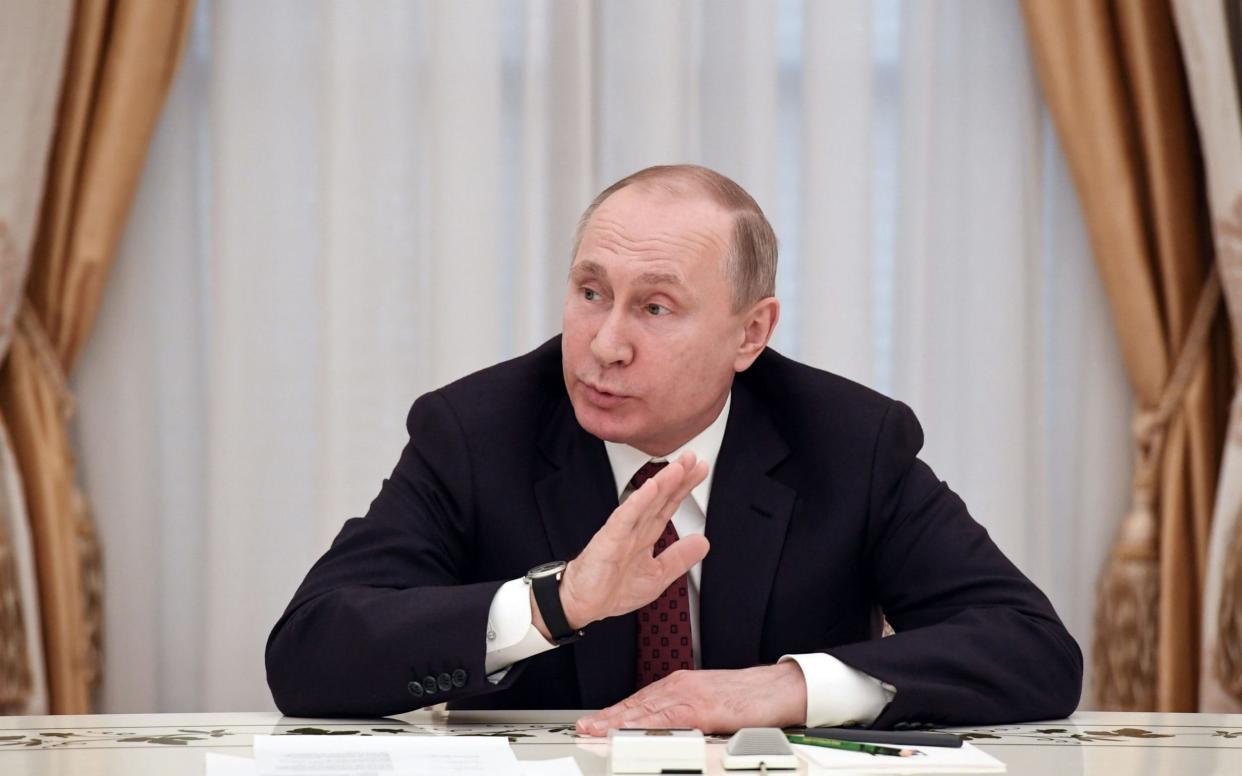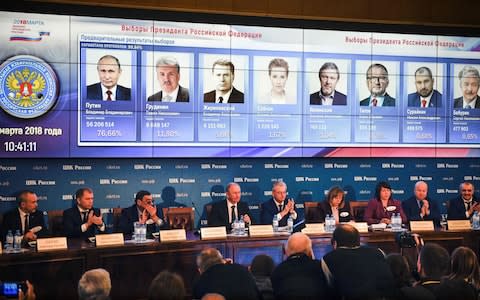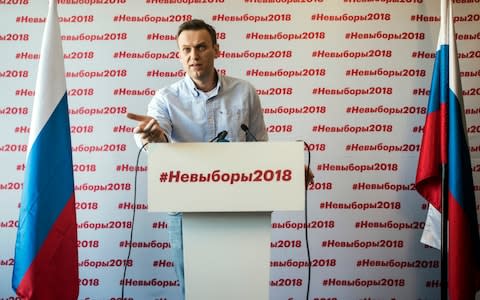Millions of votes falsified for Putin, observers claim

Millions of votes may have been falsified in Russia's presidential election, independent observers and analysts have found, calling into question the record support for Vladimir Putin reported by the authorities.
The central electoral commission said on Monday a record 56.2 million Russians had cast their ballots for Mr Putin on Sunday, giving him more than 76 per cent of the vote.
It reported a turnout of more than 67 per cent, two points higher than the target the Kremlin had reportedly set for regional authorities. Low participation could have called into question the continued rule by Mr Putin, who has already been in power for 18 years.
“The Russian presidential election: Victory for Putin, high turnout and few complaints,” state news agency RIA Novosti trumpeted.
But according to thousands of volunteer electoral observers mustered by opposition leader Alexei Navalny, the actual turnout was 55 per cent.

Mr Navalny, who announced a boycott of the election after he was barred from running on a politically tinged embezzlement conviction, sent 33,214 observers to polling stations in all but six of Russia's regions. In many cases they counted fewer ballots cast than were ultimately reported by electoral authorities.
Mr Putin would still have won and remains undeniably popular, as was seen in Moscow, where he got nearly 24 per cent more votes than in 2012, with few reported violations.
But Mr Navalny claimed that on the whole, fewer people actually voted for Mr Putin this time around. He accused the authorities of vote-rigging to avoid an embarrassingly low turnout.

“We decreased the turnout, and of course we decreased it to a lower figure than in previous elections,” he wrote in a blog post. “The regime was forced to falsify in order to raise it above 55 per cent, the number that our observer headquarters documented.”
A study by Sergei Shpilkin, a physicist known for his election analysis, suggested that nearly 10 million votes had been falsified for Mr Putin.
Plotting the turnout against the number of votes for each candidate reported by every polling station, Mr Shpilkin found that in places where the official turnout was abnormally high, Mr Putin received an disproportionately large share of the vote.

The difference between these spikes on the graph and the line showing Mr Putin's expected percentage vis-a-vis other candidates was 9,947,000 votes.
Surveillance camera footage from polling stations captured numerous instances of ballot-stuffing. In some cases, electoral workers brazenly shoved ballots into urns, while in others they tried to slip in extra votes on the sly.
The independent electoral monitor Golos received more than 2,000 complaints of violations, including more than 40 allegations of ballot-stuffing.
The central electoral commission said it had annulled the results of seven polling stations.
The Moscow region election committee has confirmed this incident of ballot stuffing captured on camera in Lyubertsy @bbcrussianpic.twitter.com/SsPaJcSHXB
— Alec Luhn (@ASLuhn) March 18, 2018
On Monday night The Foreign Office (FCO) called on the Russian government to comply with its international obligations after a human rights watchdog found "restrictions on fundamental freedoms" had resulted in a lack of genuine competition in the country's presidential election.
The Organisation for Security and Co-operation in Europe (OSCE) issued an initial report by election monitors of Vladimir Putin's overwhelming victory that saw him returned to office with nearly 77% of the vote.
An FCO spokesperson said: "The report makes clear that restrictions on fundamental freedoms, in particular freedom of expression and assembly, including the detention of activists, resulted in a lack of genuine competition in the election. The Russian Central Election Commission also placed restrictions on candidate registration, and President Putin benefited from dominating coverage in the state media.
"We continue to call on the Russian Government to comply with its international commitments in the Council of Europe and OSCE to ensure respect for human rights and fundamental freedoms, including freedom of expression."

In Chechnya, which is known for reporting 99 per cent participation in nearly every election, turnout was markedly reduced at those polling stations where Navalny observers were present.
Gleb Matveyev, 20, told The Telegraph that workers at the Chechnya polling station where he was had tried to hinder observers, but in the end reported 69 per cent turnout with “only 100 extra votes”.
“They weren't able to do 99 per cent because of the observers,” he said
Vedomosti newspaper noted on Monday that the number of registered voters had increased by 1.5 million in the hours after the election. Although not all voters can be registered before election day, that number appeared unusually high.
But the biggest problem was forced voting, a practice that observers are powerless to prevent. Russians posted photographs and videos of police voting en masse and buses bringing voters to polling stations.
Elsewhere, students and state employees reported being ordered to vote, sometimes under threat of being fired.
The Organisation for Security and Co-operation in Europe said its observers had “noted a variety of measures, some involving inappropriate pressure on voters, aimed at increasing turnout”.
An electoral official in Odintsovo, a city near Moscow, told The Telegraph that for the past two weeks, the state enterprise where he works had sent him and other employees out to knock on doors and ask people to vote.

The OSCE said the election lacked “real competition”, complaining of pressure on civil society and an absence of critical reporting.
“The problem wasn't the falsifications, the problem was how the campaign was conducted,” said Golos head Grigory Melkonyants.
“When voters are forced to go to the polling station, when they don't have information about the candidates, the media endlessly talk about one but don't mention others or speak negatively of them, when free media are lacking that could give information so voters could form a different position, that's a problem.”

 Yahoo News
Yahoo News 
